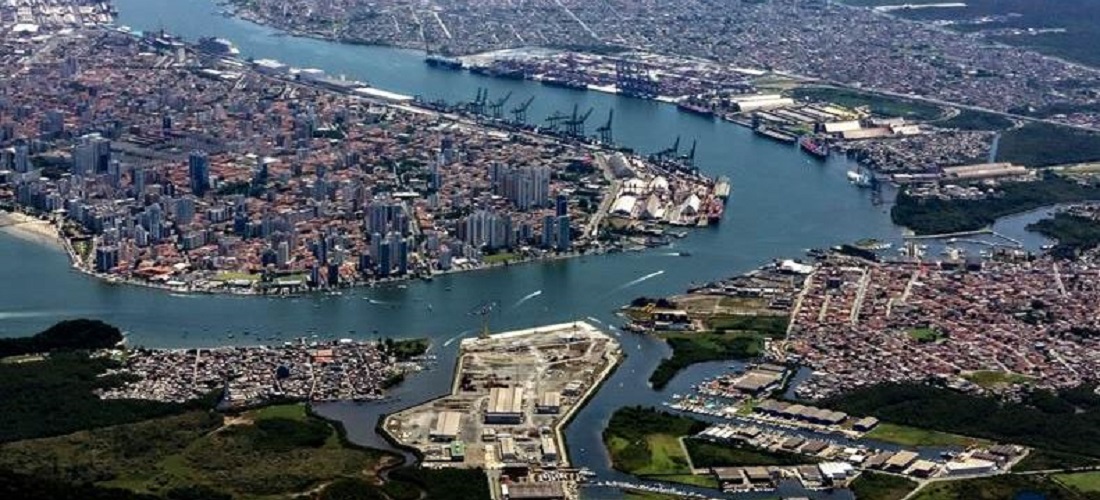
Ports account for over 90% of Brazil’s foreign trade, and Santos plays a strategic role in this
Apr, 07, 2025 Posted by Sylvia SchandertWeek 202516
Connecting sea and land, Brazilian ports are the backbone of foreign trade, handling approximately 95% of the country’s imports and exports, ensuring the supply of products that reach Brazilian homes. The most important and strategic is the Port of Santos, the largest in the Southern Hemisphere. According to the Port Authority of Santos (APS), it is connected to 600 destinations in more than 190 countries and accounts for 30% of the national commercial ow.
For the Executive President of the Brazilian Foreign Trade Association(AEB), José Augusto de Castro, the port system is paramount for the country. “The port for Brazil is life. Without ports, there is no economy, life, economic development, nothing”, he says.
Santos is the entry point for various consumer goods. It ensures that imported products reach the country efficiently, influencing the prices of goods in the market and sustaining various industries with essential inputs. Therefore, the port of Santos receives and distributes thousands of products, from the latest smartphones desired by young people to orange juice that sweetens the daily lives of the population or the fertilizers used by agribusiness to enhance the country’s crops.
Port consultant Roberto Paveck states that practically every Brazilian consumes or uses something that passes through the Port of Santos. “Whether it’s food, electronics, medicine, or a vehicle, its operation directly impacts the daily life of the population. Since the late 19th century, when it was essential for immigration and the export of coffee, it has become the main connection between Brazil and the world,” he highlights.
APS president Anderson Pomini says that China, the United States, Germany, Japan, and India are the Port of Santos’s central partner countries. São Paulo, Minas Gerais, Goiás, Mato Grosso, and Mato Grosso do Sul stand out. These states, home to 86 million people, account for more than 50% of Brazil’s GDP.
He emphasizes, “In 2024, we reached a record of 180 million tons handled. APS, responsible for managing the port, also recorded a record net profit of R$844 million. This proves the efficiency and commitment of the company, which aims to move forward even further.”
The chart below reveals Brazil’s top ten ports in terms of cargo share (container exports and imports) in January 2025. The data comes from DataLiner.
Top 10 Ports | Exports and Imports | 2025
Source: DataLiner (click here to request a demo)
Exports
The main products exported through the Port of Santos include petroleum oils and minerals (14%), iron ore (8.1%),soybeans (6.2%), unroasted coffee (4.9%), cellulose (3.7%), beef (3.8%), and sugars and molasses (3.8%). Together, these exports yield US$48.3 billion for Brazil.
He emphasizes, “Our port is responsible for the food security of several countries by exporting grains and proteins essential for massive populations in Asia, Africa, and even Europe.”
Exports total US$ 22 billion in February
Data from the Ministry of Development, Industry, Commerce, and Services shows that in February of this year, exports totaled US$22.93 billion and imports US$23.25 billion. The total trade flow amounted to US$46.18 billion, representing an 11.1% increase compared to February 2024.
The value of US$22.93 billion exported represents a 1.8% decrease compared to the same month in 2024 (US$23.35 billion). On the other hand, imports grew by 27.6% compared to February 2024 (US$18.22 billion).
The purchase of an oil platform from China worth US$2.7 billion boosted imports.
The manufacturing industry stood out in exports, with an 8.1% growth for the month. Among the main industrial products exported are cellulose and meat.
Impacts
The Port of Santos ensures the efficient flow of goods and impacts other sectors. Ivam Jardim, director of Agência Porto Consultoria, states that the system promotes jobs, infrastructure, and improvements.
“The port drives the regional and national economy by generating direct and indirect jobs, fostering the development of logistics infrastructure,” he emphasizes.
This combination of efficient logistics and strategic access enhances the possibilities for economic development and wealth generation for the country. This results in activities that directly impact the lives of local residents, such as works on Avenida Perimetral, the construction of the long-awaited Santos-Guarujá tunnel, and the ValongoPark, explains Jardim.
Imports
Among the items imported by Brazil are vehicle parts, automobiles, medicines, insecticides, herbicides, nitrogen compounds, and fertilizers, which are essential for the country. Brazil also receives vessels, platforms, and floating structures, which are employed in different sectors of the economy. The main origins and destinations of the trade flows through the Port of Santos were China, the United States, Germany, Japan, and India. International trade is intense with these countries, but expanding into new markets is a priority, according to APS, with international delegations visiting the Port of Santos year-round to explore new opportunities.
Source: A Tribuna
-
Ports and Terminals
Feb, 08, 2023
0
Cargo handling at PortosRio reaches 61.5 million tons in 2022
-
Dec, 06, 2021
0
Cargo for solar energy projects continues on upward trend at Wilson Sons Logistics Center
-
Oil and Gas
Jun, 26, 2019
0
Argentina’s Vaca Muerta finally produces oil
-
Ports and Terminals
Nov, 25, 2022
0
Sao Paulo state to build 1st green hydrogen plant near Santos

